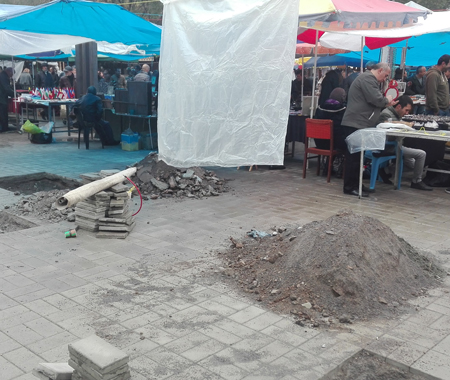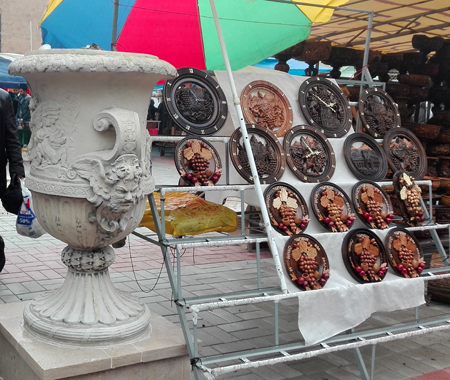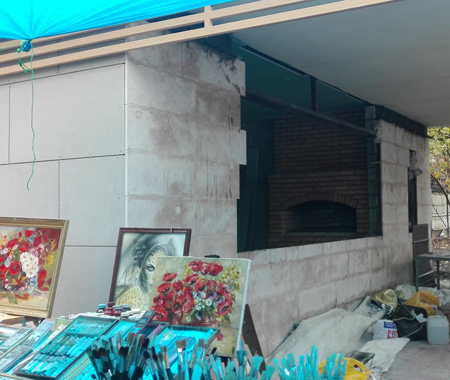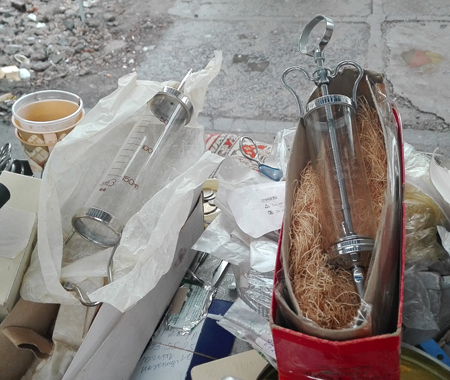For the past several months, the Yerevan Municipality has undertaken an “improvement and modernization” project at the Vernissage open-air market designed to promote tourism development; the project, which prohibits the sale of agricultural and food goods, cosmetics, perfumery, tobacco, household and computer appliances, household chemistry goods, animals, plants, flowers, medicine and medical appliances, and other goods of not souvenir character, has already left nearly 200 vendors jobless since its launch in September. Those who have to date been successful in keeping their stalls up believe the initiative to be justified since it is supposedly “getting rid of” alcoholics and making sure that only “artworks” and handmade items are sold at the market.
Vernissage has so far been “cleared of” vendors selling most types of clothes, bags, household appliances, and dogs. Many sellers who have managed to step over the threshold of “artisticism” are not only satisfied, but are also flattered for the acknowledgement of their association with art. “Vernissage is not a flea market; it’s a place for artists to sell their art. This is a positive change,” a woman selling silver jewellery told our reporter.
Hand-carved wood chess and backgammon boards, flower vases, clocks, Armenian embroidered carpets and other handicrafts are still allowed to be sold at the market. Some clothing items have also been considered worthy enough to have a place at the newly-improved Vernissage. A lady selling scarves, for instance, sounded almost convincing when explaining that the embroidery on her her hand-made scarves had special significance, and that it was a “new branch of art.”
Still, there are also those who are not quite sure yet whether they are going to stay at the Vernissage or not. According to fur saleswoman Lyudmila, shortly before our visit two men had come to tell her that fur might soon be included in the list of prohibited items. The woman, however, was not convinced that these men did in fact work for the city hall and were not imposters. A kitchenware vendor, for her part, added that these very men had told her that she could still be authorized to sell her goods if the latter were considered antiques; and she did not know how it would be decided whether the kitchenware was “antique enough.”
A café is being built in the center of Vernissage.
Another interviewee, a professional engineer who did not want to be named, said that he was one of the founders of the open-air market and was currently selling home-made machines at Vernissage.
“In Soviet years, the sale of silver and gold was prohibited. We used to sell tools, and then there came silver. If [the authors of the project] are in fact thinking about boosting tourism, then let me tell you this: tourists are more interested in our home-made equipment, and not the kind imported from China. They come here, pick the stuff up, examine it, take pictures, try it out. The lady next to me, for example, is selling vintage dental tools; Soviet-era instruments that have fallen into disuse. A foreign tourist is interested in buying this kind of souvenirs, and not woodwork.”
The engineer added that he was also concerned about the felling of trees for the sake of building 3-4 cafés in Vernissage. On the site of each of the soon-to-be-ready cafés, he said, there used to work 27 vendors; “Multiply that by the number of their family members and see how many people have been left with no money for food.”
Construction of another café on the site of cut-down trees.
A chemist who has been selling resin and different kinds of chemical apparatus for 18 years, in turn, accused the members of Yerevan municipality of being “functionally ignorant” and wanting to “kill chemistry in this country.”
“We’re not just sellers: we offer advice to 20-30 people on a daily basis,” he said, adding that the remaining 8 “chemists” in Vernissage have already been told by authorities that they could sell their stuff wherever they wanted but here.
Prepared by Knar Khudoyan
 Epress.am News from Armenia
Epress.am News from Armenia




